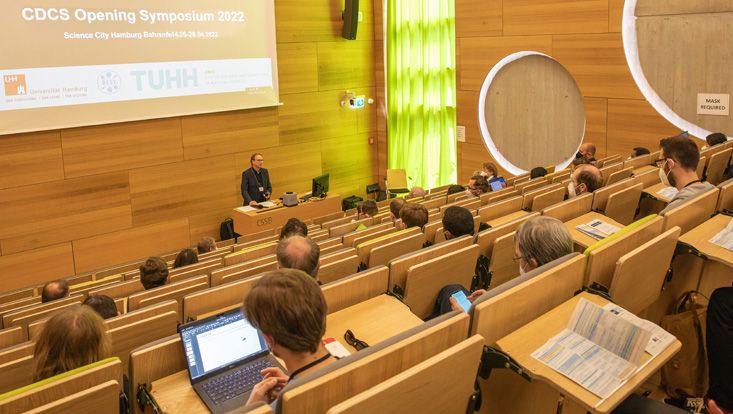Inaugural Symposium of the "Center for Data and Computing in Natural Science" (CDCS)

Tuesday, 3.05.2022
Boost for Data Science in the Natural Sciences
The natural sciences have made great progress in recent decades with the help of computers. In 2020, the "Center for Data and Computing in Natural Science" (CDCS) was established in Hamburg as the Hamburg-X project to develop new informatics concepts for processing and analysing the gigantic amounts of data from research. In interdisciplinary teams, physicists, chemists and biologists are researching with computer scientists on innovative methods using data science and machine learning. The CDCS kick-off symposium was held on the Science City Hamburg Bahrenfeld campus from 26 to 28 April 2022.
The event was opened by the Senator for Science, Research, Equality and Districts (BWFGB), Katharina Fegebank, and representatives of the participating institutions, Prof. Jan Louis (University of Hamburg), Prof. Andreas Timm-Giel (Hamburg University of Technology), Prof. Helmut Dosch (DESY) and Prof. Matthias Rarey (University of Hamburg , spokesperson of the CDCS).
About 140 computer-savvy researchers from the fields of physics, chemistry, biology and computer science took part in the symposium with the theme "Data Science for Interdisciplinary Research". The focus was on the discussion of how current computer-based techniques from the fields of machine learning, data engineering and also quantum computing, can be used in these multidisciplinary areas. The participating research groups of the CDCS presented their current research progress, showed unconventional, cross-disciplinary problem solutions and established new collaborations.
![Prof. Matthias Rarey, Sprecher des CDCS [Foto: DESY/Mayer] Prof. Matthias Rarey, Sprecher des CDCS [Foto: DESY/Mayer]](/images/news/CDCS-Rarey.jpg)
"After the initiation of the degree programmes Computing in Science and Data Science and the successful launch of the Helmholtz Graduate School DASHH, the CDCS is the third cornerstone for shaping the digital sciences in Hamburg," says computer science professor Matthias Rarey, spokesperson of the CDCS. "With the software infrastructure available today, it has become easy to use machine learning for all kinds of data. However, this is not enough for scientific excellence. Application data must be modelled to fit computational approaches, complex software systems must be built as well as maintained, and customised algorithms for specific application problems are needed. All these tasks are easier for researchers to accomplish in collaboration with the computer scientists of the CDCS."
Text by Heiko Fuchs (UHH)
Centre for Data and Computing in Natural Science
The CDCS is a new interdisciplinary joint facility of the University of Hamburg, the German Electron Synchrotron (DESY) and the Hamburg University of Technology with the aim of combining scientific research with state-of-the-art information technology. The CDCS initially consists of four application-oriented, cross-disciplinary labs (CDLs) supported by a Computational Core Unit (CCU). The CDLs focus on the following areas:
- Computational astrophysics and particle physics.
- Computational photon science
- Computational systems biology
- Computer-aided control of accelerators.
The CDCS is funded by "Hamburg X" from the Ministry of Science, Research, Equality and Districts (BWFGB) and is an important building block for the future Science City Hamburg-Bahrenfeld.
Latest news about Leibniz ScienceCampus InterACt